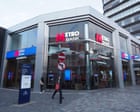Some departures from the shrinking London stock market hurt more than others. It is doubtful that Metro Bank, if it’s about to fall toan approach from a London private equity firm, will be mourned by those shareholders on the wrong end of the wild ride for the shares from£20 at listing in 2016, to £40 two years later, to a plunge andpainful recapitalisation at just 30p in 2023.
In the overhyped early years, Metro said it was going to revolutionise high street banking via the novel strategy of opening expensive branches while the fuddy-duddy old guard were closing them. The party ended in an arduous tale ofan accounting blunder,run-ins with regulatorsand a need for more capital, factors that inevitably weighed more heavily than the bank’s gimmicks such as giving free dog biscuits to the customers’ canines.
But – surprise, surprise – Metro these days is not an enfeebled lender waiting to be put out of its misery.In recapitalised and less flashy formfor the last couple of years, it has been making quiet progress from its lowered horizons. The branches have been kept, but costs have been taken out, most of the loan-book has been redirected towards small businesses and the number of accounts has grown. Profits appeared again at the end of last year.
If you caught the bottom for the sharesin 2023’s rescue deal, as Colombian billionaire Jaime Gilinski Bacal did by topping up his stake to 53%, you did well. Even before potential takeover interest from Pollen Street Capital,as reported by Sky News at the weekend, the shares had improved to 112p. It is why Metro doesn’t necessarily need to throw itself into the arms of Pollen Street at any price.
The would-be bidder’s reported interest is probably motivated by thoughts of a second deal to combine Metro and Shawbrook, the business-focused lender that Pollen Street owns with fellow private equity outfit BC Partners. It’s true that a combination would have financial logic on its side. Metro would bring cheap funding from a sticky deposit base of current accounts; Shawbrook has a faster-growing loan book across buy-to-let mortgages, commercial property and small businesses. “The value for Shawbrook in maintaining asset growth momentum at the same time as reducing deposit costs is potentially significant,” argue analysts at KBW.
As they also say, a deal hinges on two factors. First, whether Metro’s management and shareholders – critically, Gilinski – want to head to the exit at a point when the reinvention of their bank is supposed to have several more laps to run. Second, the price Pollen Street would be prepared to offer. But the market clearly expects a deal: Metro’s shares rose 18% to 133p, giving a £890m valuation.
It makes you wonder what might have been if Metro, version one, hadn’t attempted an all-conquering retail strategy that took it to the brink of collapse and a near-quadrupling of the share count.Version two– sober, better capitalised and with small businesses as the target for lending – has been vastly better.
